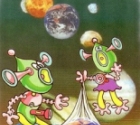WHAT'S BREWING The Israeli Microbrewery Revolution Anglo Breweries in Israel
Category: Food/Wine Issue No. 160
There is a revolution in Israel and it is happening right under our very noses: the microbrewery revolution. 2011 is all about beer. It’s happening without fanfare and minimal publicity, especially in the Israeli English language media. Not that the press has ignored it completely. However, what was a novelty a year ago, is now verging on a national phenomenon.
A microbrewery produces beer in small quantities relative to the large commercial breweries. These hand-crafted beers are made with premium ingredients using classic brewing techniques and guided by a passionate brewmaster who doesn’t spare the time or attention required to make a truly excellent beer.
The large commercial breweries produce beers in a limited range of styles and flavors, usually light, delicately flavored lagers like Heineken, based in Holland, and Tuborg and Carlsberg, originally from Denmark. In countries with a strong beer culture, like the UK, Ireland, Germany and Belgium, smaller commercial breweries produce high quality beers in a wide variety of styles suited to local tastes. Many of these quality brands are now available in selected pubs and stores allowing Israelis to experience a wide range of beer styles and flavors.
Microbreweries forgo the large beer markets to concentrate on brewing beers that go beyond even the best quality beers from large commercial breweries. A true craft beer is brewed to the tastes of the brewmaster and can range from finely honed classic beers to experimental combinations of traditional and non-traditional flavors.
The Israeli microbrewery story is largely an Anglo one but not only, although almost every Israeli beer maker is somehow influenced by a “foreign” power, be it the US, England, Belgium or Germany.
The microbrewery revolution was quietly fomented by a cadre of home brewers aspiring to greater and greater achievements in both quality of the product and commercial success. The revolution was urged on by figures on the Israeli brewing scene such as Shahar Hertz of Beer and Beyond and Gad Dviri of Beer-D, as they organized festivals and beer events and imported and sold equipment and materials for making beer.
The January Beer Exhibition 2011 at the Nokia stadium in Tel Aviv showed how far the revolution has progressed. The number of licensed commercial microbreweries has grown in leaps and bounds to more than 20 currently with several more waiting for the final authorizations before receiving their licenses. These breweries produce a range of beers exhibiting brewing maturity, creativity and the use of local Israeli flavors.
The first licensed microbrewery in Israel was the Dancing Camel Brewery in Tel Aviv. David Cohen made aliyah from the US and opened the brewery three years later in 2006, producing a variety of carefully crafted boutique beers. Dancing Camel beer is available in a number of pubs, restaurants and stores in Israel as well as the pub attached to the brewery.
Being the first revolutionary in a revolution is not easy, as David will attest. Israelis are used to their usual local brews of Goldstar and Maccabi. However the beer scene in Israel has expanded in the last couple of decades to include imported brands such as Tuborg, Carlsberg and Heineken. However, don’t let the “foreign” brand confuse you. Just read the labels on the bottles. Tuborg and Carlsberg are brewed under license in Israel by the Central Bottling Co., the bottlers of Coca Cola. Heineken is made in Netanya by Tempo, the company that produces Goldstar and Maccabi.
David Cohen was the first but not the last Anglo to enter the commercial microbrewery craft beer fray.
Even before there was a fray there was Danny Shleifstone’s Art Bar in Ein Hod. Having survived the big Carmel fire of 2010, Danny is again busy brewing beer, telling beer jokes and hosting musicians in the center of Ein Hod. With years of beer brewing experience, Danny makes a variety of beers all the way from blond ales to stouts. With creative names like “Beat the Heat Wheat” and “Yo Mama’s Carmel Buns” Danny explores the full range of beer styles and flavors, allowing the craft beer newbie to learn about a whole new world of tastes and flavor sensations.
Jem’s Beer Factory was founded by two American immigrants, Daniel Alon and Jeremy (Jem) Welfeld, in an industrial area of Petah Tikva. Jem’s isn't just a place where they brew beer but a full-fledged restaurant serving 6 kinds of beer ranging from a Czech Pilsner to an Irish stout. Jem’s is a rarity on the Israel craft brewing scene in that they make genuine lager beers, the Pilsner and a dark lager. Lagers require refrigeration and more time to brew, but Jem’s choice of making a beer that goes head to head with the large commercial breweries is a daring one and brings true Central European brewing tradition to the Middle East.
Another fixture on the brewing scene is Denny Neilson who owns and operates The Winemaker in Mevasseret Zion where he sells supplies for brewing wine, beer and even apple cider. Denny is also an accomplished brewer and he has won prizes at local festivals. His advice and encouragement has been critical to a number of local brewers, some of whom are on the path to opening licensed breweries.
The Lone Tree Brewery, based in Gush Etzion, was founded by Susan and Yohanan Levin and David Shire and is truly an international venture. Susan and Yohanan are from the US and David is from Glasgow. Lone Tree beers combine the flavors of the American microbrewery revolution and the grand British brewing tradition, with a little Eretz Yisrael thrown in for variety. The California Steam Ale is reminiscent of Anchor Steam Beer, one of the great beers produced by one of the few American microbreweries that predated the American Revolution (the brewing revolution, not the other one). The Extra Oatmeal Stout and the English Northern Ale are true British beers while the seasonal Pomegranate Date Ale combines the flavors of three of the biblical 'seven species' with true craft brewing spirit.
This short survey of Anglo brewers in Israel should by no means convince anybody that the craft brewing revolution is in any way only an Anglo phenomenon. There are over 20 licensed breweries and a large number of home brewers producing beers that are truly creative and tasty.
How can you keep up with the progress of this revolution? Some of the larger wine and spirits stores are now stocking local products well worth tasting from breweries like the Golan or Alexander breweries. Restaurants like Porter and Son in Tel Aviv are serving a selection of Israeli boutique beers both in bottles and from kegs. Your best bet is to ask before you order a beer if there is a local quality beer. If they answer “Goldstar” you should probably give up on that pub or restaurant in your search for true blue and white handcrafted beer.
There are also beer festivals and exhibitions on a regular basis. Spring and summer are the times for beer festivals including those in Kibbutz Maabarot, Tel Aviv and Jerusalem. Follow my Beer Blog at www.IsraelSeen.com for more information.
Also check out the links below:
Breweries in this article:
Dancing Camel Brewery - http://www.dancingcamel.com/
Art Bar Ein Hod - http://ein-hod.info/rest/artbar/
Jem’s Beer Factory - http://www.jems.co.il/
The Winemaker - http://www.isra-ale.com/
Lone Tree Brewery - http://www.lonetreebrewery.com/
Other Breweries:
Golan Brewery - http://www.beergolan.co.il/english_main.php
Harley Zipori is a longtime beer enthusiast and recently has become an avid home brewer. He also co-chairs the ESRA Adult ADHD Group. He blogs about beer in Israel at http://israelseen.com/category/harley-zipori-beer-blog/.
 MEMBERSHOP PERKS-An ESRA Modiin Initiative
MEMBERSHOP PERKS-An ESRA Modiin Initiative KINDERTRANSPORT JUNE 5-6 1939
KINDERTRANSPORT JUNE 5-6 1939 HOW TO CARE FOR YOUR CHILD'S TEETH
HOW TO CARE FOR YOUR CHILD'S TEETH-1516356428.jpg) Hand in Hand Food Pantry
Hand in Hand Food Pantry Forever Slim
Forever Slim Food Foolish
Food Foolish Harley Zipori
Harley Zipori